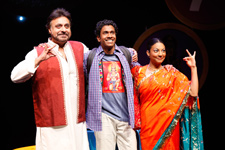 |
| Pictured: Tony Mirrcandani, Raja Burrows, and Soneela Nankani in a scene from Tea with Chachaji (photo © Carol Rosegg) |
Based on the award-winning book Chachaji's Cup by Uma Krishnaswami, Tea with Chachaji—a Making Books Sing commission—is a world-premiere musical that features the history and culture of India. Indian-born Chachaji, Neel's Great Uncle, sips chai as he entertains his great nephew with captivating Hindu stories and exciting Bollywood movies. The greatest story of all, and the most difficult to share, is found in Chachaji's teacup. This precious heirloom migrated with young Chachaji and his mother from Pakistan to India after the Partition of 1947. As Neel grows older and busier, so grows the distance between his American life and Indian traditions. In one careless moment, the teen shatters the teacup and his uncle's heart. As he repairs the broken pieces of both, Neel comes to understand the true value of family heritage. Performances are in three different locations in Bronx, Manhattan, and Brooklyn; check the website.
In my experience a show for young audiences needs most importantly to hold that audience's attention. Tea with Chachaji, the latest production from Making Books Sing, not only does that but it does so with an intelligent and warm story that spans ages and cultures. That's no small feat and this production achieves it with talent and story enough to engage its adult audience as well.
Tea with Chachaji is an emotionally satisfying and intellectually interesting musical about the power of stories, and the tension between respecting tradition while assimilating to a new culture. It's the story of Neel Gupta, a 13-year-old American of Indian descent, being raised by his mother in Jackson Heights with the help of his great uncle or "Chachaji." Every afternoon, after school or his Bollywood dance classes, Neel visits Chachaji who entertains him with stories from his family and Hindi culture such as the exciting adventures of Hanuman, the monkey god and friend to Rama. When Neel becomes friends with a neighbor kid from a different heritage, the tension between respecting his Hindi family and traditions and assimilating into a new and exciting world comes to a crisis.
The diverse cast of five skillfully cross generations and borders to not only bring to life the streets of Jackson Heights but also to transport the audience to another time on the other side of the world. Neel is believably and charmingly played by adult actor Raja Burrows. Soneela Nankani embodies the kindness, strength, and self-sacrifice of an ideal mother. Jose Sepulveda playfully portrays Neel's Latino friend, Daniel, who with innocent mischief becomes the impetus for Neel's need to rebel. And Tony Mirrcandani's wonderful deep voice gives Chachaji the strength and pride of one generation passing a family's legacy on to another.
A standout number is handled wonderfully by Stephanie Klemons. Chachaji tells Neel how his mother, Neel's great-grandmother, took her family on foot to India after the Partition. In 1947 Great Britain gave the country its independence but also split it into two, creating India and Pakistan. When Chachaji was Neel's, age the Gupta family, like many Hindi families at the time, became refugees from the newly formed Moslem state of Pakistan. They took only what they could carry. In this particularly beautiful and sad song, Klemons movingly portrays putting all her hope in a teacup as her voice seems to penetrate the audience with that profound sadness. The teacup becomes a powerful symbol of the fragile lives of refugees and the perseverance of family and tradition.
Rajendra Ramoon Maharaj's direction lets the cast tell the story with craft and few stage effects. A circular video projection is a rare effect used to help transport the audience from contemporary Jackson Heights to 1947 India in Cory Einbinder's spare, colorful, and functional set. And Leslie Bernstein's costumes, including fun masks, help the cast quickly switch character and culture.
The book and lyrics by Gwynne Watkins and music by Denver Casado skillfully tells the story of Neel's complex personal crisis of being a rebellious teen and also the embodiment of an immigrant family's expectations while holding the audience's attention throughout the hour-long show. Just as it seemed a kid near me might be getting restless, an exciting key song—about how Hanuman discovers what he's capable of when someone he loves needs him most—pulled his attention back. It's a fun song of adventure that works emotionally because of all that's happened before it. It demonstrates the power of stories, one of the themes of the show, and also keeps us involved in the Gupta family's crisis.
I was also happy I stayed for the after-show discussion with Watkins and the cast to hear how some of the cast's personal stories reflect the show's. The production succeeds wonderfully to bring what could seem like distant history to immediate life and to hear cast members relate their own families' journeys was doubly uplifting and reinforced the theme of the production.
Tea with Chachaji, like all Making Books Sing productions, is based on a book. The company's 14-year mission "to empower children to experience literature and theatre as vehicles for their imaginations" is commendable and, in the case of Tea with Chachaji, well done. As one child in the talk-back told the cast and librettist, "I think it was a good show. It was fun and sometimes sad but I liked it." I have no doubt the show will make kids want to read the book, learn about Hindi culture, and become curious about their own heritage. |

